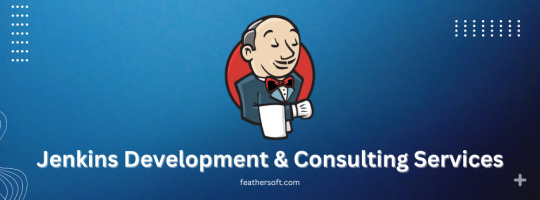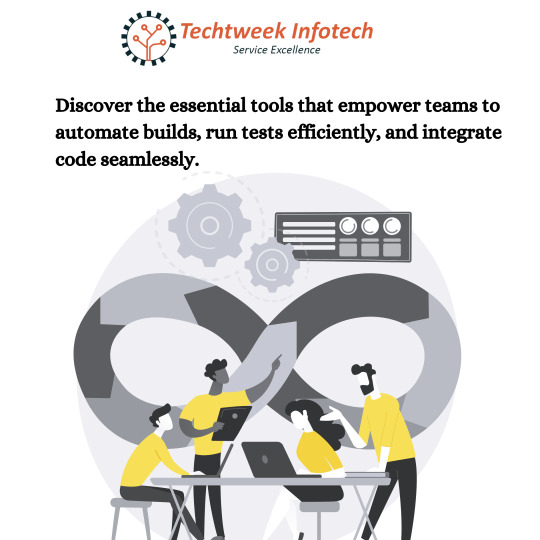#Jenkins Automation
Explore tagged Tumblr posts
Text
🚫 Stop Saying: "DevOps = Development + Operations"
✅ Start Understanding: DevOps is a Culture, Not Just a Combination
DevOps isn't just about merging two departments; it's a methodology that fosters collaboration, automation, and continuous improvement across the software development lifecycle.
Dive deeper into DevOps methodologies and learn how to implement them effectively in your organization.
📌 Follow us for ❤️ @nareshitech
#DevOpsCulture#ContinuousIntegration#Automation#SoftwareDevelopment#TechInnovation#devops#aws#cloudcomputing#linux#python#cloud#technology#programming#developer#coding#kubernetes#devopsengineer#azure#cybersecurity#software#java#datascience#docker#javascript#softwaredeveloper#css#machinelearning#devopstools#jenkins
1 note
·
View note
Text
#PollTime
What tool automates software deployment?
A) Jenkins 🏗️
B) Firewall 🚧
C) VPN 🔐
D) SQL 🗄️
Comments your answer below👇
💻 Explore insights on the latest in #technology on our Blog Page 👉 https://simplelogic-it.com/blogs/
🚀 Ready for your next career move? Check out our #careers page for exciting opportunities 👉 https://simplelogic-it.com/careers/
#itcompany#dropcomment#manageditservices#itmanagedservices#poll#polls#software#softwaredevelopment#jenkins#firewall#vpn#sql#automates#tools#itservices#itserviceprovider#managedservices#testyourknowledge#simplelogic#makingitsimple#simplelogicit#makeitsimple#itconsulting
0 notes
Text
Tip: Focus on What value you get once Cloud Solution is implemented for next business growth OR innovation.
Do you know, Techjour's Cloud Solution reduces business operating cost, gives security to data and flexibility to focus more on your business. It meets immediate on-demand business need, in fast moving digital world.

#devopsengineer#devopstools#devops#cloud solutions#cloud service provider#cloud services#google cloud#cloudcomputing#cloudmigration#cloudconsulting#kubernetes#ansible#jenkins github#startup#automation#technology#trendingnow#successful business#small business#digital business#docker#sme#entrepreneur#digital strategy
0 notes
Text

🚀 Build Your Career with DevOps Master Certification Training 🚀
Upgrade your skills and advance your career with the DevOps Master Certification Training offered by Upgrade My Skill, the global leader in professional training. This advanced 3-day course empowers you with in-depth knowledge of DevOps principles, modern tools like Git, Docker, and Jenkins, and practical expertise to excel in IT application management.
🌟 Whether you're an application developer, Agile Scrum Master, or IT service manager, this globally acclaimed training bridges the gap between software development and operations. Learn continuous development, deployment, automation, and collaboration strategies that enhance IT agility and service lifecycles.
📍 Available in multiple U.S. cities and online, our expert trainers bring real-world case studies and best practices to you. Don’t miss this chance to boost your career in the fast-growing world of DevOps!
👉 Enroll Now: https://www.upgrademyskill.com/us/devops-master-certification-training
#DevOpsTraining#DevOpsMasterCertification#UpgradeMySkill#ProfessionalDevelopment#ITCertification#AgileScrum#ApplicationManagement#ContinuousDevelopment#ContinuousDeployment#Automation#ConfigurationManagement#SoftwareDevelopment#DevOpsTools#Git#Docker#Jenkins#Puppet#Nagios#TeamCollaboration#ITServiceAgility#AgileMethodology#ScrumMaster#CareerGrowth#TechTraining#ITCareer#CloudComputing#ProjectManagement#SkillUpgrade#TechSkills#USATraining
0 notes
Text
Revolutionizing Software Development: Understanding the Phases, Lifecycle, and Tools of DevOps
DevOps refers to the combinations of Development and Operational Skills. Basically, to overcome the long, time-consuming process of traditional waterfall models, DevOps are preferred. Nowadays many companies are interested to employ engineers who are skilled at DevOps.It integrates development and operations i.e. it takes a combination of software developers and IT sector.

Phases of DevOps
DevOps engineering consists of three phases:
Automated testing
Integration
Delivery
DevOps lifecycle
DevOps mainly focuses on planning, coding, building and testing as the development part. Added is the operational part that includes releasing, deployment, operation, and monitoring. The development and operational part make up the life cycle.
DevOps team & work style
In business enterprises, DevOps engineers create and deliver software. The main aim of this team, in an enterprise environment, is to develop a quality product without the traditional time consumed.
DevOps employs an automated architecture which comes with a set of rules, a person who has worked as a front-runner for the organization, will lead the team based on the company’s beliefs and values.
A Senior DevOps engineer is expected the following skills
Software testing: The responsibility increases along with coding new requirements to test, deploy and monitor the entire process as well.
Experience assurance: The person follows the customer’s idea to develop the end product.
Security engineer: During the development phase the security engineering tools to be used in the security requirements.
On-time deployment: The engineer should ensure that the product is compatible and running at the client’s end.
Performance engineer: Ensures that the product functions properly.
Release engineer: The role of the release engineer is to address the management and coordination of the product from development through production. Release ensures the coordination, integration, flow of development, testing, and deployment to support continuous delivery and maintenance of the end-end applications.
System admin: Traditionally system admin focuses only on the server running. But DevOps handles the open source pros, passionate towards technology, and hands-on with development platforms and tools. They maintain the networks, servers database and even support.
Usage of the DevOps tools
The Git tool is a version control system tool used to develop the source code by developers and send it to the Git repository and we have to edit the code in the repository.
Jenkins is a powerful application tool that allows the code from the repository using the git plugin and builds it using tools like Ant or Maven.
Selenium is an open-source automation tool. The Selenium tool performs regression and functional testing. Selenium is used for testing the code from Jenkins.
Puppet is a configuration management and deploys testing environment.
Once the code is tested, Jenkins sends it for deployment on the production server.
Then the completion of Jenkins it goes to be monitored by tools Nagios.
After the monitoring process, Docker containers provide a testing environment to test the built features.
Basic technical knowledge for DevOps recruiters:
The DevOps recruiters should follow basic methodologies such as agile, continuous delivery, continuous integration, microservices, test-driven development, and infrastructure as a code.
They must know the basic scripting languages such as Bash, Python, Ruby, Perl, and Php.
The recruiters must know the infrastructure automation codes such as Puppet, chef, Ansible, Salt, Terraform, Cloud formation, and Source code management such as Git, Mercurial, and Subversion.
The developers should study cloud services such as AWS, Azure, Google Cloud, and open stack.
Another skill is orchestration. In programming, to manage the interconnections and interactions among the private and public clouds.
Next one is containers, a method of OS virtualization that allows you to run an application and its dependents in a resource-isolated process, it includes LXD, Docker.
The recruiters should be able to manage multiple projects, simultaneously.
They must know the usage of tools for continuous integration and delivery. Such as Cruise control, Jenkins, Bamboo, Travis CI, GOCD, Team Foundation server, Team City, Circle CI
Testing tools such as Test Complete, Testing Whiz, Serverspec, Testinfra, In Spec, Customer Driven Contracts. Recruiters must know the monitoring tools such as Prometheus, Nagios, Icinga, Zabbix, Splunk, ELK Stack, collected, CloudWatch, Open Zipkin.
In conclusion, DevOps combines development and operational skills to streamline the software development process, with a focus on planning, coding, building, testing, releasing, deploying, operating, and monitoring. The DevOps team is responsible for creating and delivering quality products in an enterprise environment using automated architecture and a set of tools such as Git, Jenkins, Selenium, Puppet, Nagios, and Docker. DevOps recruiters should have basic technical knowledge of agile, continuous delivery, scripting languages, infrastructure automation, cloud services, orchestration, containers, and project management, as well as proficiency in various tools for continuous integration and delivery, testing, and monitoring.
#DevOps#SoftwareDevelopment#Automation#ContinuousIntegration#ContinuousDelivery#DevOpsTools#AgileMethodology#Docker#Jenkins#Git#Selenium#Puppet#Nagios
0 notes
Video
youtube
Complete Real-World DevOps Project | Deploy using K8S from Ansible | Rep...
#youtube#linux k8s git dockerfile DevOps Kubernetes Jenkins Docker Ansible CI_CD GitHub DockerHub Webhooks ReplicaSet NodePort Automation DevOpsPipel
0 notes
Text
Jenkins Development & Consulting Services | Automating Your Software Delivery Pipeline

In today’s fast-paced software development landscape, the ability to deliver high-quality applications quickly and efficiently is crucial. Continuous Integration and Continuous Delivery (CI/CD) have become standard practices for achieving this, and Jenkins, an open-source automation server, plays a pivotal role in streamlining these processes. For organizations looking to enhance their software delivery pipeline, partnering with Jenkins development and consulting experts can be the key to unlocking greater efficiency and faster time-to-market.
Why Jenkins?
Jenkins is widely recognized as a powerful tool for automating the software development process. It allows teams to continuously build, test, and deploy code, ensuring that software is always in a deployable state. With its extensive plugin ecosystem and strong community support, Jenkins can be customized to meet the unique needs of any development environment.
Key benefits of Jenkins include:
Automation: Jenkins automates repetitive tasks, such as code compilation, testing, and deployment, freeing up developers to focus on writing code and solving complex problems.
Continuous Integration & Continuous Delivery: Jenkins enables CI/CD practices by automatically integrating code changes and delivering updates to production, reducing the risk of errors and ensuring rapid delivery of features.
Extensibility: With over 1,500 plugins available, Jenkins can be integrated with a wide range of tools and technologies, from version control systems to cloud platforms, making it highly adaptable to different workflows.
Scalability: Jenkins can handle projects of any size, from small teams working on a single application to large enterprises managing hundreds of projects simultaneously.
The Role of Jenkins Developers
Jenkins developers are specialized professionals who understand how to configure, customize, and optimize Jenkins to meet the specific needs of your development environment. Their expertise ensures that Jenkins is not just a tool, but a seamless part of your software delivery pipeline.
Key responsibilities of Jenkins developers include:
Pipeline Development: Creating and managing Jenkins pipelines that automate the entire software delivery process, from code integration to deployment.
Plugin Management: Selecting, configuring, and maintaining the right plugins to extend Jenkins’ functionality and integrate it with other tools in your development ecosystem.
Security Configuration: Implementing security measures to protect your Jenkins environment, ensuring that only authorized users can access and modify the pipeline.
Performance Tuning: Optimizing Jenkins to handle large-scale projects and ensuring that builds and deployments are performed quickly and efficiently.
The Value of Jenkins Consulting Services
While Jenkins is a powerful tool, its complexity can be overwhelming for organizations that are new to CI/CD practices or lack in-house expertise. This is where Jenkins consulting services come into play. A consulting partner like Feathersoft Info Solution can provide the guidance and support needed to implement Jenkins effectively and align it with your business objectives.

Benefits of partnering with Jenkins consulting services include:
Customized Implementation: Consulting experts assess your current development processes and design a Jenkins implementation that fits your unique requirements, ensuring a smooth integration into your workflow.
Best Practices: Leverage industry best practices to optimize your Jenkins setup, ensuring that your CI/CD pipeline is efficient, reliable, and scalable.
Training and Support: Equip your team with the skills they need to manage Jenkins effectively through comprehensive training and ongoing support.
Continuous Improvement: Regular assessments and updates ensure that your Jenkins environment evolves with your business, adapting to new challenges and scaling as needed.
Conclusion
Jenkins has revolutionized the way software is developed and delivered, making it an essential tool for any organization looking to adopt CI/CD practices. However, to fully leverage its capabilities, it’s important to have skilled Jenkins developers and the strategic guidance of a consulting partner. Whether you’re just starting with Jenkins or looking to optimize your existing setup, partnering with experts like Feathersoft Info Solution can help you streamline your software delivery pipeline, improve efficiency, and accelerate time-to-market. With the right support, Jenkins can become a powerful asset in driving your business forward.
#Jenkins#DevOps#Automation#SoftwareDevelopment#ContinuousIntegration#ContinuousDelivery#JenkinsPipeline#TechConsulting
0 notes
Text
Jenkins is a widely used open-source automation server that streamlines various aspects of the software development process, such as building, testing, and deploying code. For automation testers, having a solid understanding of Jenkins can be highly beneficial. This article presents a collection of typical Jenkins interview questions to help automation testers prepare effectively.
0 notes
Text
Continuous Integration/Continuous Deployment (CI/CD)
Continuous Integration/Continuous Deployment (CI/CD) practices revolutionize software development, driving speed, reliability, and continuous improvement. CI ensures early issue detection and high code quality, while CD automates deployments for faster releases. Popular tools like Jenkins, GitLab CI/CD, CircleCI, and Travis CI streamline automation. Overcome challenges and implement best practices for successful adoption, and explore essential tools like Kubernetes and Terraform. Revolutionize your software development with DevOps and CI/CD for the modern digital landscape.

Read More On: Continuous Integration/Continuous Deployment (CI/CD)
#ContinuousIntegration#ContinuousDeployment#CI#CD#DevOps#Automation#SoftwareDevelopment#Jenkins#GitLabCI#CircleCI#TravisCI#Kubernetes#Terraform#DevOpsBestPractices#Agile#SoftwareEngineering#itAgenturen
1 note
·
View note
Text

BellOps - Automate the parts of software development related to building, testing, and deploying, facilitating continuous integration, and continuous delivery.
0 notes
Text
Exploring Essential Tools for Continuous Integration in DevOps

In the realm of DevOps, continuous integration (CI) plays a pivotal role in streamlining software development processes. Discover the essential tools that empower teams to automate builds, run tests efficiently, and integrate code seamlessly. From popular CI/CD platforms like Jenkins and GitLab CI to robust testing frameworks like Selenium and JUnit, this comprehensive guide dives deep into the tools that drive continuous integration in DevOps workflows.
Are you navigating the complexities of DevOps testing? Dive into our comprehensive guide on testing in DevOps, where we explore the critical role of continuous integration in ensuring software quality and reliability. Discover the latest tools and best practices that empower teams to automate testing, streamline workflows, and achieve faster, more reliable releases.
#devops#continuousintegration#ci#cd#softwaredevelopment#automation#testing#jenkins#gitlabci#selenium#junit#devopstesting#softwarequality#workflowautomation#releasemanagement#development#technology#innovation
0 notes
Text
Build the Future of Tech: Enroll in the Leading DevOps Course Online Today
In a global economy where speed, security, and scalability are parameters of success, DevOps has emerged as the pulsating core of contemporary IT operations. Businesses are not recruiting either developers or sysadmins anymore—employers need DevOps individuals who can seamlessly integrate both worlds.
If you're willing to accelerate your career and become irreplaceable in the tech world, then now is the ideal time to sign up for Devops Course Online. And ReferMe Group's AWS DevOps Course is the one to take you there—quicker.

Why DevOps? Why Now?
The need for DevOps professionals is growing like crazy. As per current industry reports, job titles such as DevOps Engineer, Cloud Architect, and Site Reliability Engineer are among the best-paying and safest careers in technology today.
Why? Because DevOps helps businesses to:
Deploy faster using continuous integration and delivery (CI/CD)
Boost reliability and uptime
Automate everything-from infrastructure to testing
Scale apps with ease on cloud platforms like AWS
And individuals who develop these skills are rapidly becoming the pillars of today's tech teams.
Why Learn a DevOps Online?
Learning DevOps online provides more than convenience—it provides liberation. As a full-time professional, student, or career changer, online learning allows you:
✅ To learn at your own pace
✅ To access world-class instructors anywhere
✅ To develop real-world, project-based skills
✅ To prepare for globally recognized certifications
✅ J To join a growing network of DevOps learners and mentors
It’s professional-grade training—without the classroom limitations.
What Makes ReferMe Group’s DevOps Course Stand Out?
The AWS DevOps Course from ReferMe Group isn’t just a course—it’s a career accelerator. Here's what sets it apart:
Hands-On Labs & Projects: You’ll work on live AWS environments and build end-to-end DevOps pipelines using tools like Jenkins, Docker, Terraform, Git, Kubernetes, and more.
Training from Experts: Learn from experienced industry experts who have used DevOps at scale.
Resume-Reinforcing Certifications: Train to clear AWS and DevOps certification exams confidently.
Career Guidance: From resume creation to interview preparation, we prepare you for jobs, not course completion.
Lifetime Access: Come back to the content anytime with future upgrades covered.
Who Should Take This Course?
This DevOps course is ideal for:
Software Developers looking to move into deployment and automation
IT Professionals who want to upskill in cloud infrastructure
System Admins transitioning to new-age DevOps careers
Career changers entering the high-demand cloud and DevOps space
Students and recent graduates seeking a future-proof skill set
No experience in DevOps? No worries. We take you from the basics to advanced tools.
Final Thoughts: Your DevOps Journey Starts Here
As businesses continue to move to the cloud and automate their pipelines, DevOps engineers are no longer a nicety—they're a necessity. Investing in a high-quality DevOps course online provides you with the skills, certification, and confidence to compete and succeed in today's tech industry.
Start building your future today.
Join ReferMe Group's AWS DevOps Course today and become the architect of tomorrow's technology.
2 notes
·
View notes
Text
GitLab Forge was officially adopted in 2023 by the French Ministry of Education to create a "Digital Educational Commons" of educational resources. Available services of GitLab forge are similar to Github and GitLab but in a local hosting on a academic servers.
gricad-gitlab is a collaborative tool, intended for use by the research and higher education community in Grenoble.
#grenoble#aws cloud#cloudforge#technology#business#startup#gitlab#microsoft azure#docker#automation#jenkins github#cloud solutions#gcp cloud consulting services#google cloud#french#aws
0 notes
Text
Continuous Integration: The Backbone of Modern DevOps

Content: Continuous Integration (CI) is more than a buzzword—it’s a discipline that transforms how teams build and deliver software.
In CI, developers frequently merge code changes into a central repository where automated builds and tests are run. This practice catches integration issues early, reduces merge conflicts, and encourages iterative development.
Popular tools like Jenkins, GitLab CI/CD, and CircleCI allow developers to automate everything from build processes to security scans. As projects scale, implementing solid CI practices becomes critical for maintaining velocity without sacrificing stability.
Modern service providers often integrate Software Development robust CI pipelines into their project delivery models, ensuring faster, safer deployments for their clients.
By promoting collaboration and early problem detection, continuous integration supports a healthier, more agile development process.
Treat your CI pipeline configuration as code. Version-control it alongside your application code to track changes and maintain consistency across environments.
3 notes
·
View notes
Text
A Better Understanding of DevOps Services

A better understanding of DevOps Services can be simply put as a combination of Development and Operational Skills. Basically, to overcome the long, time-consuming process of traditional waterfall models, DevOps are preferred. Nowadays many companies are interested to employ engineers who are skilled at DevOps. DevOps integrates development and operation i.e. it takes both software developers and IT sector. DevOps engineers must play nice as they have to collaborate, and handle an automated infrastructure, workflow and continuously measuring application performance.
DevOps service phases
DevOps engineering consists of three phases:
1. Automated testing
2. Integration
3. Delivery
The lifecycle of DevOps
DevOps services mainly focus on planning, coding, building, and testing as the development part. Added is the operational part that includes releasing, deployment, operation, and monitoring. The development and operational parts make up the life cycle.
Team members of DevOps
In business enterprises, DevOps service engineers create and deliver software. The main aim of this team, in an enterprise environment, is to develop a quality product without the traditional time consumed.
The DevOps service employs an automated architecture which comes with a set of rules, a person who has worked as a front runner for the organization will lead the team based on the company’s beliefs and values.
A senior DevOps engineer is expected the following skills.
Software testing:
The responsibility increases along with coding new requirements to test, deploy and monitor the entire process as well.
Experience assurance:
The person follows the customer’s idea to develop the end product.
Security engineer:
During the development phase the security engineering tools to be used in the security requirements.
On-time deployment:
The DevOps Service engineer should ensure that the product is compatible and running at the client’s end.
Performance engineer:
Ensures that the product functions properly.
Release engineer:
The role of the release engineer is to address the management and coordination of the product from development through production. Release ensures the coordination, integration, flow of development, testing, and deployment to support continuous delivery and maintenance of the end-end applications.
System admin:
Traditionally system admin focuses only on the server running. But DevOps Services handles the open-source pros, passionate towards technology, and hands-on with development platforms and tools. They maintain the networks, servers, and databases and even support them.
Most popular DevOps tools
Git is a version control system tool
Jenkins, Selenium are Continuous Integration Testing tools that use predefined frameworks.
Puppet, Chef, Ansible are configuration management and deployment tools
Nagios is a Continuous monitoring tool
Docker is a container concept tool.
Usage of the DevOps tools
Git tool is a version control system tool that is used to develop the source code by developers and sent to the Git repository and we have to edit the code in repository.
Jenkins is a powerful application tool that allows the code from the repository using the git plugin and builds it using tools like Ant or Maven.
Selenium is an open-source automation tool. The Selenium tool performs regression and functional testing. Selenium is used for testing the code from Jenkins.
Puppet is a configuration management and deploys the testing environment.
Once the code is tested, Jenkins sends it for deployment on the production server.
Then the completion of Jenkins goes to monitored by tools Nagios.
After the monitoring process Docker containers provides a testing environment to test the build features.
Basic technical knowledge for DevOps recruiters
The DevOps service recruiters should follow basic methodologies such as agile, continuous delivery, continuous integration, microservices, test-driven development, and infrastructure as a code.
They must know the basic scripting languages such as Bash, Python, Ruby, Perl, and PHP.
The recruiters must know the infrastructure automation codes such as Puppet, Chef, Ansible, Salt, Terraform, Cloud Formation, and Source code management such as Git, Mercurial, and Subversion.
The developers should study cloud services such as AWS, Azure, Google Cloud, and Open Stack.
Another skill is orchestration. In programming, to manage the interconnections and interactions among the private and public clouds.
The next one is containers, a method of OS virtualization that allows you to run an application and its dependents in resource-isolated processes. it includes LXD, and Docker.
The recruiters should be able to manage multiple projects, simultaneously.
They must know the usage of tools for continuous integration and delivery. Such as Cruise control, Jenkins, Bamboo, Travis CI, GOCD, Team Foundation server, Team City, Circle CI
Testing tools such as Test Complete, Testing Whiz, Serverspec, Testinfra, In Spec, Customer Driven Contracts.
Recruiters must know the monitoring tools such as Prometheus, Nagios, Icinga, Zabbix, Splunk, ELK Stack, collected, CloudWatch, Open Zipkin.
Conclusion
In this article, we discuss the basics of DevOps Services. It includes the phases, the roles & finally, the lifecycle and usage of the tools and skills for recruiters.
#DevOps#DevOpsServices#ContinuousIntegration#Automation#DevOpsTools#DevOpsLifecycle#SoftwareDevelopment#ITInfrastructure#AgileMethodology#CloudComputing#DevOpsEngineer#Jenkins#Git#Docker#Selenium#PerformanceEngineering#SystemAdmin#DevOpsRecruitment#CloudInfrastructure#InfrastructureAsCode#AutomationTools#TechRecruiting
0 notes
Text
DevOps AWS Training| IntelliQIT | Best DevOps AWS Training in Hyderbad
Ameerpet in Hyderabad is a hub for IT training, offering many institutes for DevOps courses. DevOps helps automate and improve software development and IT operations. Here are some things to look for when choosing a best devops training institute in hyderabad:
Comprehensive Course Content
Covers essential DevOps tools like Jenkins, Docker, Git, and Kubernetes.
Includes both basic and advanced topics.
Hands-on Training
Focus on real-time projects to get practical experience.
Live demos and interactive sessions.
Flexible Learning Options
Offers both online and classroom classes to suit your schedule.
Some institutes provide free demo classes.
Placement Support
Helps with job placements through resume building and interview prep.
Offers guidance for certifications if needed.
Experienced Trainers
Trainers with real-world DevOps experience.
Good student-to-trainer ratio for personalized attention.
When choosing an institute, make sure it offers practical training, expert guidance, and good placement opportunities to kickstart your career in DevOps.
#devops training institutes in ameerpet#best devops training institute in hyderabad#devops training in ameerpet
2 notes
·
View notes